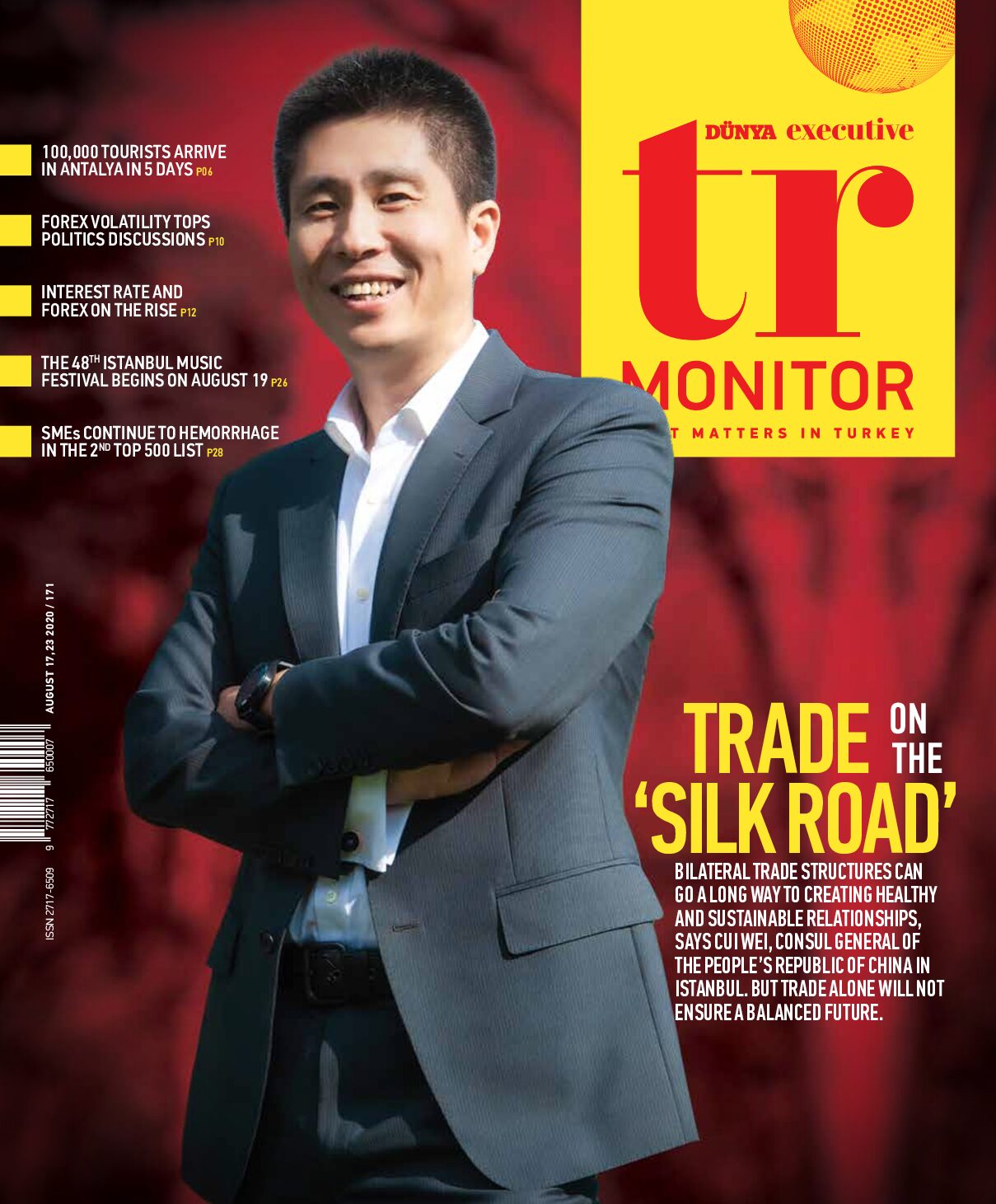CHINA AND TURKEY SHOULD SEEK A COMPREHENSIVE AND MUTUALLY BENEFICIAL BALANCE IN MANY SECTORS, SUCH AS INVESTMENT, CONTRACTING AND THE SERVICES TRADE, INCLUDING TOURISM, SAYS CUI WEI, CONSUL GENERAL OF THE PEOPLE’S REPUBLIC OF CHINA IN ISTANBUL
By HUSNIYE GUNGOR
speaks with the kind of linguistic CUI WEI ease that you would expect from an accomplished diplomat. “Located at the two ends of the historical Silk Road,” China’s Consul General in Istanbul says in fluent Turkish, “China and Turkey are natural allies, with their mutual history and cultural bonds, for the development of the Belt and Road Initiative.”
But trade alone, Wei adds, will not ensure a balanced relationship. More contacts need to be established, like the deep attachment he has developed to Istanbul, where his diplomatic career began 25 years ago.
In an exclusive interview with TR Monitor, Wei evaluated the current course of bilateral trade relations with Turkey.
Annual trade volume between China and Turkey was $20.81 billion in 2019, a 3.4 percent decrease according to Chinese figures. China was the third biggest trading partner for Turkey after Germany and Russia in the same year. In the first half of 2020, trade volume increased by 8.9 percent annually to $10.68 billion. The increase in bilateral trade volume while global trade was suffering from the pandemic shows that economic and trade cooperation between the two countries is highly complementary, according to Wei.
With China’s rising imports from Turkey, the bilateral trade structure is consistently optimized towards healthier and sustainable development, says Wei. “Turkey attended the first China International Import Expo (CIIE) in 2018 with 43 companies occupying 800 square meters and signed $620 million in trade deals. The exhibition area was increased to 2,000 square meters hosting 58 companies the following year,” he notes.
TRADE IMBALANCES MATTER
The consul general emphasizes that the Chinese government attaches great importance to trade imbalances, noting that balance has been continuously improving since 2008 with the joint efforts of the two countries. “China’s Belt and Road Initiative gave a clear message to the world about ‘joint development.’ With the implementation of the initiative, more Turkish products will enter the Chinese market, and I believe this will contribute to further deepening of bilateral economic and commercial cooperation,” he says.
The consul general cites the agreement signed with China in the export of dairy products in the first half of the year. “Fifty-four
Turkish company received export licenses to China, which is one of the largest dairy importers in the world with a market of nearly $6 billion. Turkey has the production capacity and the extensive industrial infrastructure to meet China’s demand for dairy products.”
TRADE ALONE IS NOT ENOUGH
On the other hand, imbalances in the relationship cannot be solved through trade alone, Wei remarks. The two countries should seek a comprehensive and mutually-beneficial balance in many sectors, such
as investment, contracting and the services trade, including tourism. “The good news is that the number of Chinese tourists with high spending power exceeded 400,000 for the first time in 2018,” Wei says.
Advantageous financial services, movie production, software and related sectors in Turkey can be promoted in line with targets, according to Wei, who emphasizes the increase in real estate transactions between the two countries in recent years. He also underlines that Turkey’s agricultural exports to China can be developed. “However, the two governments need to strengthen communications and formulate a set of regulations that meet their national circumstances and legal requirements.”
Trade figures from the last two years show that China’s top imports from Turkey were mining products while mechanical and electrical products were on the top of the list for exports. Turkey’s exports to China in sectors such as animal and herbal products has increased rapidly as cooperation between the two countries in agriculture reached $700 million 2019. However, Wei thinks that this commodity classification data is not important for Turkey when you consider that China’s annual import market $2.1 trillion. “No matter which sector, there is sufficient space in China for imports from Turkey, as long as the products are competitive.”
TURKISH CHERRIES ENTER CHINA
The successful entry of Turkish cherries and other products into the Chinese market in recent years is good news, but it is only a small step, according to the consul general, who notes the importance of increasing the cost-effectiveness of products in order to compete with the U.S., Canada and Chile and to offer a new premium option to Chinese consumers. “Production capacity should be increased on the other hand, because Turkey can’t meet the demands of Chinese consumers even it sells all of its cherries to China. The fact that agricultural exports constitute a small portion of Turkey’s total exports in terms of both quantity and value is one of the issues that should be investigated,” Wei says.
The consulate in Istanbul continued to be an economic and commercial bridge during the pandemic by sharing the developments in both countries with Chinese and Turkish businesses. Cherry exports from Turkey, China’s CRRC Group’s winning of the Istanbul Airport metro vehicles tender, usage of the WeChatPay system in the Istanbul Airport, and Chinese cargo trains reaching Turkey are some of the developments that took place in the first half of the year. “We wholeheartedly believe that concrete cooperation of our parties in all areas will develop further after the pandemic,” Wei says, underlining the importance of one to one meetings in business with a Chinese proverb: “What is heard may be wrong, but what is seen is truth.” Mutual knowledge and understanding between the peoples of China and Turkey is still very incomplete and we need to establish more contact with each other, Wei stresses.
‘MY ATTACHMENT TO ISTANBUL IS VERY DEEP’
“I always believe that learning a foreign language opens the door to a better understanding of a country. My knowledge about Turkey gradually increased after learning Turkish.
“You have to learn something even if you get old,” Chinese people say, like a foreign language. My Turkish is improving gradually. I love Adana and doner kebabs and like to stroll t he streets of Istanbul to discover new flavors. Istanbul was the city where my diplomatic career started 25 years ago, where I was first appointed. So my attachment to it is deep. As the place where East and West meet, Istanbul’s transparency and tolerance impressed me. I love to work and live here and hope more Chinese friends come to see firsthand the beauty of Istanbul and Turkey.”
USE OF LOCAL CURRENCY TO INCREASE IN BILATERAL TRADE
Chinese and Turkish central banks signed a swap agreement in 2012 which was renewed twice – in 2015 and 2019. Its current scale is RMB 12 billion (TRY 10.9 billion.) Turk Telekom and Turkcell conducted their imports from
China in RMB in June. Some Turkish banks also benefited from RMB sources as part of these swap agreements to support bilateral economy, trade and investment cooperation. As RMB is a relatively stable and strong currency, it took attention of all parties in Chinese-Turkish trade, according to Cui Wei, Istanbul Consul General of
People’s Republic of China in Istanbul. “With the renewal of the swap agreement between the People’s Bank of China and the Turkish Central Bank and the Turkish government’s initiative for the use of local currencies in bilateral trade payments, trade between the two countries is expected to grow further.”
EMBA: THE BIGGEST INVESTMENT IN A SINGLE PROJECT
Turkey was one of the first countries to support China’s Belt and Road Initiative. Projects like the Ankara-Istanbul highspeed train stage II, the opening of the ICBC and Bank of China branch in Turkey, Kumport Port and EMBA thermal power plant are emblematic of the cooperation between
China and Turkey. Among them, Kumport is a highly localized business model with only two Chinese employees involved. The EMBA thermal power plant, which is under construction with a $ 1.7 billion investment, is the highest ever Chinese investment in a single project in Turkey. It also has the highest technology and environmental protection standards in Turkey, and even in Europe.
INCREASE IN TRADE DESPITE PANDEMIC
>> Chinese total direct investment in Turkey has reached $2.67 billion with $18.37 million FDI in the first half of 2020, a 177.1 percent increase compared to last year
>> Chinese investment in Turkey covers a wide range of areas such as banking, transport, energy and communications.
>> More than 1,000 Chinese companies have branches in Turkey including 70 large and medium scale companies such as ICBC Bank, BOC Bank, PowerCHM, SPICER, COSCO Shipping, Huawei and ZTE.
>> The leading Turkish companies operating in China are ATA holding, Arzum, Zorlu, TEBA, Arcelik, Demir Dukum, Garanti BankasŨ and Sisecam.
>> Turkey has invested in a total of 1,123 projects in China with an investment of $283 million as of June 2020.
>> Trade volume between China and Turkey reached $10.68 billion with an 8.9 percent increase in the first half of the year.
>> The number of Chinese tourists who came to Turkey last year was 426,000, an 8.2 percent increase over the previous year.
>> Chinese took third place among foreigners who bought homes in Turkey in the first half of this year.










